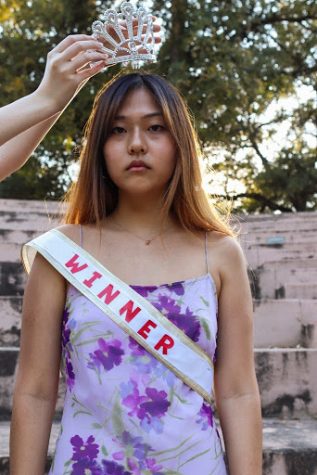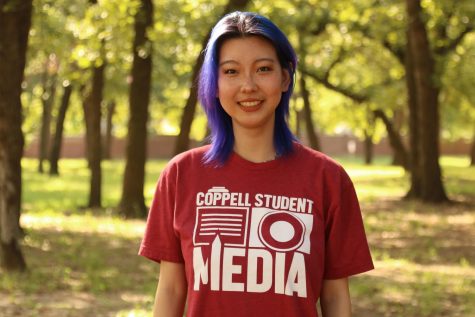Surrendering the crown
Why the “model minority” should support other minorities

Coppell High School senior Michelle Tack wears a crown and sash, representing how East Asians in America are often used as a “model minority” to demean other people of color. The Sidekick staff writer Joanne Kim shares her opinion on how the model minority stereotype can put Asian Americans in a place of privilege, and what they can do to support other minority groups.
October 29, 2020
As an East Asian girl living in America, getting good grades was practically a personality trait. I was the kid everyone came to for answers, the kid who cried if I forgot to bring my homework, the kid who never got anything below an A.
But there was a certain point where I stopped and had a realization. Yes, I was getting good grades, but that didn’t mean I was good at school, nor did I enjoy it. It was what was expected of me.
Somehow, unwittingly and unwillingly, I had been conditioned by the model minority stereotype.
According to Harvard University, the term “model minority” is “used to refer to a minority group perceived as particularly successful,” and that “in particular, the model minority designation is often applied to Asian Americans.”
The term “Asian American” itself is convoluted. While Chinese, Korean and Japanese Americans often live as middle and upper-class citizens, other Asian American subgroups such as the Hmong or Bhutanese have poverty levels higher than the U.S. average. In this column, I will be referring to the former, more privileged group.
The stereotype that Asians are smart and successful did not come from nowhere. Our graduation rates from college are high, our divorce rates are low, and overall, we rank as the highest earning ethnic group in the United States.

Where fact becomes fiction is when people assume that this label is a result of us being naturally smarter or naturally “less problematic.” This is an issue not only because it erases the diversity of Asian Americans, but also because it can be used as an excuse to demean other minorities.
But the fact of the matter is, the reason we are depicted as “good” has nothing to do with our biology and everything to do with the placement of our ethnicity and race in America’s history.
We were never taken to America as slaves. Our lands were never invaded and overrun by western colonizers. Yes, there was conflict amongst Asian countries, and yes, there were instances of discrimination such as the Chinese Exclusion Act of 1882 and the Japanese internment camps. However, we weren’t thoroughly invaded and colonized by white people, we weren’t the victims of mass genocide at any point in American history and we don’t live on reservations.
It is true that the reason why many of us go on to be successful is because we have a hard working culture, but it is also because we have many tools at our disposal. Most of our families prioritize education, and that in itself is huge.
For lots of other minorities, education is a luxury. You get if you can afford it. If you can survive through 12th grade without dropping out to support your family, if you can graduate with passing grades in an underfunded school, then you can consider college. Whereas for Asian people, we cry if we don’t get into an Ivy League. The standards are completely different.
Even at Coppell High School, despite how diverse our student body appears to be, only 5% of students at CHS are African American.
“I was an [International Baccalaureate] student, and there was one Black person in [the entire program],” said former Sidekick editor-in-chief Kelly Wei, a 2019 Coppell High School graduate. “In those high performing classes, there’s very much a divide, a boundary. I hate to say it, but that’s just kind of how the system works. And even within the suburban community, there are even more layers that separate you from certain ethnicities.”
Right now, the best thing privileged Asians in America can do is use their voice. We need to have those awkward conversations with our families and make it clear that we are not bystanders. We will not put up with the injustice of being put on a pedestal and shoved in a box of expectations, only to then be used as a way to belittle other minorities.
“Many Asian-Americans opt out of being involved with politics because they view it as something negative,” Coppell City Council candidate John Jun said. “But if you’re an American citizen, you’re [partially] an owner of this country. You can be part of the decision-making. So if you’re an owner of this country, why not take part in it? Why not voice your opinion? Why not talk about things that you want? If you have the right to exercise your freedom of speech, why not?”
It’s time to understand that although we are a minority and have our own set of struggles, it is a different level of struggle. Groups like African Americans, Latinos and Native Americans are not the model minority. They are a group of people who have been persecuted and stolen from and thoroughly dehumanized by the American system. So, instead of getting defensive and argumentative, we need to listen to their stories. We need to be empathetic and echo what they are saying back to our own communities who might not have that exposure.
“As someone involved with education, I think it’s important for us to not only educate ourselves on our own privileges and biases, but to also educate the students we’ve been entrusted with,” CHS9 English teacher Joy Han said. “Because without understanding internal bias, you’ll never see the big picture.”
It is a matter of objective perception. If you do not know where you are, if you don’t know where you stand in the history of things, your context of everything else around you is incomplete. If you don’t recognize that you have benefited from the efforts of other minority groups, your perception of them will inevitably be skewed. So, for your sake and for everyone else’s, inform yourself, advocate for the truth and always check your privilege.
Follow Joanne (@joan_kkim) and @CHSCampusNews on Twitter.











Andrew Zhang MD • Dec 3, 2020 at 2:19 pm
I read with great interest and concern about the article on “East Asian privilege.” The privilege in this case refers to East Asian students getting good grades at school in general. The author makes a direct link between this “privilege” with the student’s ethnicity. The author seems to also imply that this “privilege” is undeserving. Academic success is NOT the result of one’s ethnicity, it’s the result of other factors and at the forefront is the choices the students and their families make, to put education first. These students’ families made the choice to maintain a strong core family unit, to value education, and to devote time and money toward their children’s education. This is a choice and it’s certainly not exclusive to East Asians. First, not all East Asian families put the education of their children first, and it’s unfair to generalize. Making similar choices, other groups of minorities in the US can and have achieved the same “privilege.” Prominent examples are Jewish and Indian people. I wonder if the author would call them privileged groups also.
There is also real danger in singling out a minority group of people to put into a class of the so called “privileged”, to become targets of hate from others. One not need to search further than pre-world war 2 Germany to see how making the Jewish people the scapegoat of the decimated German economy due to their “privilege” can be devastating, and to see the effects of just how horrible this kind of talk can be (Holocaust). We need to stop putting people into groups based on race, ethnicity, sex, religion, etc. As Dr. King said in his famous speech, we really need to focus on the content of one’s character and not the color of his/her skin! Many students of East Asian decent, the author included, are the product of his/her and his/her parent’s choices. We are not defined by our skin color!
On a personal note, I immigrated to the US from China when I was 16.5 years old. Not knowing a word of English, I started in ESL (English as a second language) beginning class at a public high school in Los Angeles. A school in city much worse than Coppell. I am the only child of a poor immigrant family. I slept on the living room floor of a single bedroom apartment for several weeks when I first arrived in the US. I had reduced-fee lunch throughout high school. Knowing the achievable but steep uphill battle to realize my American Dream of a happy, fulfilling and successful life, I studied extremely hard. I chose to. I did enjoy the company of my many friends from school and several extracurricular activities, but I never lost focus of my class work. I took summer school, and with the help of my counselor, I planned my courses well. Two and half years later, I graduated with a 4.2 GPA and got into a great college. I did not slack in college. I chose to pursue a career in medicine. I took the MCAT during sophomore year and scored higher than all my peers. How did I do it? I studied and studied and studied. I didn’t experiment with drugs, I didn’t get into a relationship, and I didn’t party. I focused on my goal and that’s MY choice. I paid my tuition through the work study programs, research and being a teaching assistant in many classes. I graduated as the Salutatorian from my college class and went to Stanford Medical School. By any definition, I was not a “privileged” East Asian student. The odds were against me. My success is based on my intellect, hard work, the unwavering support of my parents and making good choices. In medical school, I met my wife. My wife is a Mexican immigrant also raised in a poor family in Los Angeles. We shared a very similar story of success. She also went to a public high school. Since she was a child, she wanted to be a doctor. She maintained this focus throughout high school and college. She chose to focus on her studies, maintained excellent GPAs and did great on her MCAT. She worked hard to support herself through school by doing research and tutoring many subjects. We came from drastically different Ethnic backgrounds and arrived at Stanford Medical School at the same time. The common denominator in our story is our focus, our drive, and making good choices. Now we have daughters of mixed races. Are they Chinese American? Are they Mexican American? I don’t believe that matters. I hope we can all work hard for a future where their race and ethnicity does not determine their worth.
Dr. Andrew Zhang, MD
Neha Desaraju • Nov 10, 2020 at 10:38 pm
I absolutely love this story Joanne! It made my think a lot deeper about where I stand in society. It’s a beautifully written, well-researched piece!
Mary Carmen Hernandez-Zhang • Nov 9, 2020 at 8:37 am
Where is the part of the story where Asians are being discriminated against at Ivy League Universities? There is a lawsuit against Harvard right now. Why do Asians have to obtain higher test scores and have more extra-curricular activities to be accepted,?? If you are Hispanic or African American, you are admitted with lower scores, grades, and extra-curriculars. Let’s see an article about THAT. What about the 1860’s when Asian Americans were slaves working on the American Railroad system, and not allowed to marry white women, because it was against the law. So don’t shame Asians now by trying to make them feel some BS “priviledge”. Where I am coming from: I am a Latina who went to Stanford Medical School. I had the amazing grades, the extra-curriculars and the scores, and I know 6 languages and sing opera. I resented being looked at as a “Minority” and people thinking that I got into Stanford because I am Mexican. I grew up poor, but I worked my butt off. I had jobs to help support my family, but I never allowed that to interfere with my academic life. I have no shame or BS feeling of “privilege” now either, now that I am a doctor. I EARNED everything I have, and so have Asians whose parents immigrated to the US to work, with empty pocketbooks.
Sapna Amin • Oct 29, 2020 at 11:44 pm
This is an AMAZING story!! Pictures are beautiful!!